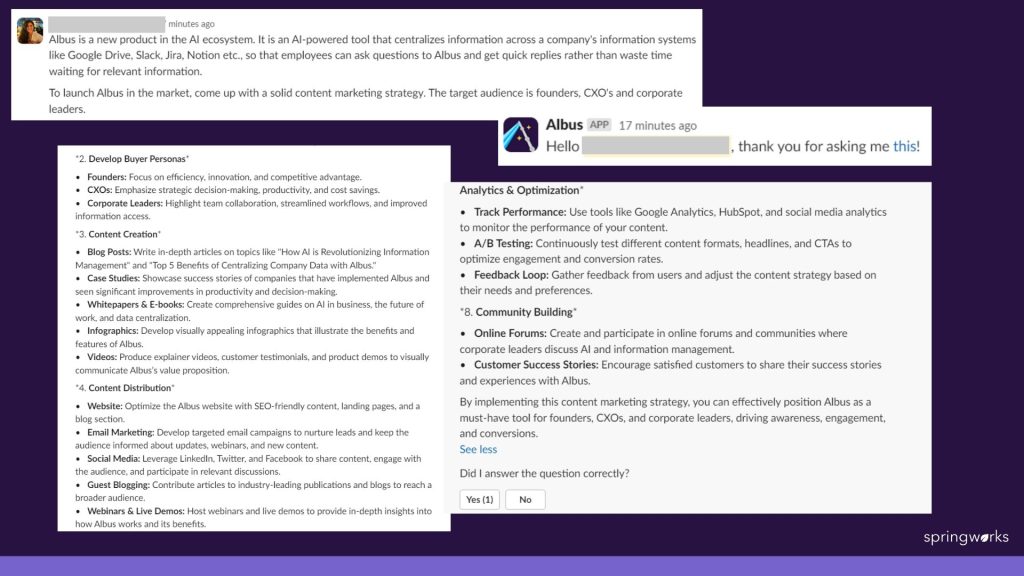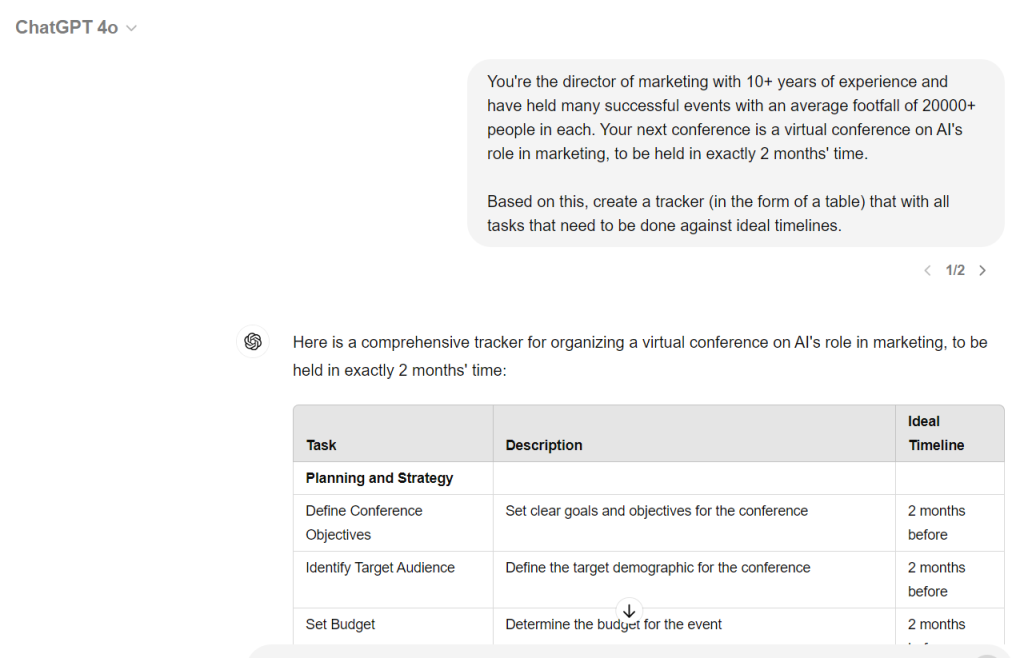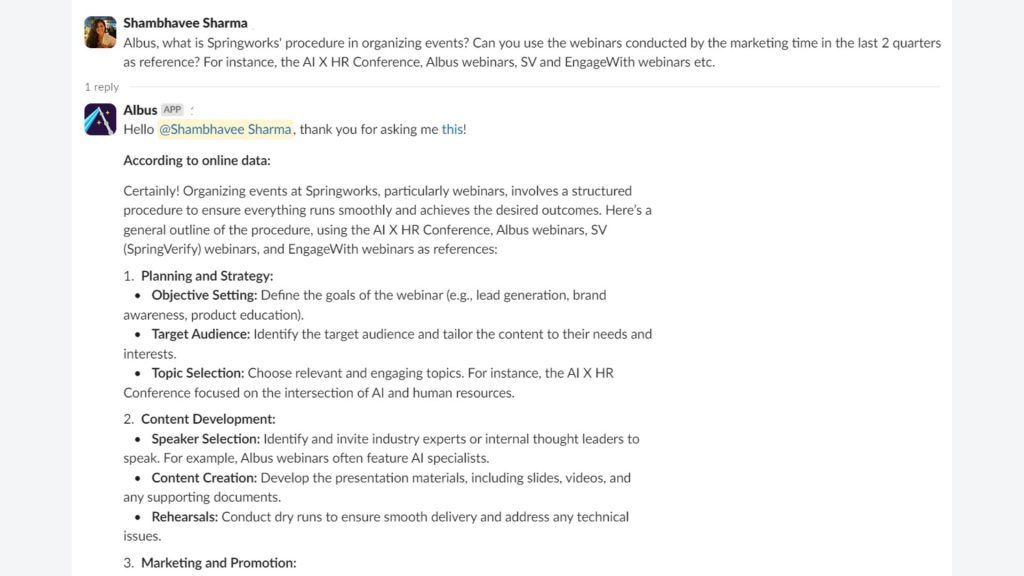AI in Marketing: Transforming Strategies and Driving Results
Here are the facts:
AI is here to stay
Marketing - well, you can't do without it if you're part of any kind of business
Marketing needs speed. Volume. Thoroughness.
If you're a marketer - you need AI.
Artificial Intelligence is revolutionizing the marketing landscape, offering unprecedented opportunities for efficiency, personalization, and insight.
This blog explores the various ways AI is reshaping marketing. To begin with, let's look at where the world currently stands in terms of AI in marketing.
The Rising Adoption of AI in Marketing
Key Statistics
Global Adoption: 90% of marketers in 35 countries used AI tools to automate customer interactions. (Source). Increasing the adoption of marketing automation is deemed crucial by 67% of marketers for customer acquisition and retention (Mailchimp)
Workflow Efficiency: In a 2023 survey by Statista, 52% of marketing professionals using AI tools reported enhanced speed and efficiency of workflows and processes. Additionally, 51% noted significant improvements in data processing capabilities.
Cost Savings and Efficiency: 54% of organizations report that AI provides cost savings and efficiencies.(Source)
Effective Use Cases: In a global survey conducted in 2023, 84% of marketers indicated that the most effective use of AI and marketing automation is aligning web content with search intent. Improving user experience (80%) and enhancing Search Engine Results Pages (SERP) rankings (74%) followed closely. (Source)
Personalization: 88% of marketers working with AI say the technology has helped them personalize the customer journey across different channels. (Source)
Skill Gaps: 34% of businesses cite limited AI skills, expertise, or knowledge as a barrier to AI adoption. (Source)
AI and Automation in Marketing
Automation streamlines repetitive marketing tasks, allowing marketers to focus on strategic activities.
Email Marketing
AI automates email marketing campaigns, including follow-ups and drip campaigns. Tools like Mailchimp and HubSpot use AI to personalize email content and optimize send times.
How it helps: Automated email campaigns means increased efficiency, cost effectiveness, and enhanced personalization. This also allows companies to scale their email marketing efforts without a proportional increase in costs or workload, making it easier to grow in reach and impact.
Optimized Send Times:
Behavioral Insights: AI can analyze when recipients are most likely to open their emails, optimizing send times to increase open rates and engagement.
Global Reach: For companies with international audiences, AI can schedule emails to be sent at optimal times for different time zones, enhancing the effectiveness of global campaigns.
Customer Journey Optimization: AI personalizes content based on customer interactions, enhancing each stage of the journey. It tailors communications to effectively nurture leads and retain customers.
Improved Analytics and Insights:
Performance Tracking: AI tools can provide detailed analytics on email performance, including open rates, click-through rates, and conversion rates. This data helps marketers understand what works and what doesn't, enabling continuous improvement.
Predictive Analysis: Advanced AI can predict future trends and customer behaviors, helping marketers to make informed decisions and refine their strategies.
Social Media Management
AI tools schedule and manage social media posts and respond to customer inquiries. Platforms like Statusbrew, Hootsuite and Buffer use AI to optimize posting schedules and content performance.
AI-Powered Content Creation
AI-powered content creation tools significantly enhance the efficiency and effectiveness of marketing efforts by automating and optimizing the generation of various types of content.
Copywriting
AI tools like ChatGPT can generate engaging and persuasive copy for advertisements, social media posts, email campaigns, and blog articles. Furthermore, an AI humanizer can assist in making AI-generated text more relatable and engaging.
With the advent of advanced models like GPT-4 and 4o, the quality, depth, and research of marketing content has reached new heights, allowing for rapid content generation.
SEO Optimization
AI can provide keyword suggestions and optimize content to avoid an SEO ranking drop and even improve search engine rankings. Nowadays, white label seo software integrates with ai to improve user experience
Tools can also use AI to analyze search trends and competitor strategies, helping marketers craft content that ranks higher in search results with the guidance of an SEO expert for maximum visibility..
Content Strategy
AI can also help with creating an entire content strategy from scratch, based on your needs and goals.
An example of this in progress can be seen through the graphic below, where the AI-powered tool Chat Aid has been used. Chat Aid is an intelligent workplace search tool that makes it easy for teams to access the information they need by building a comprehensive knowledge base from multiple sources (like Google, Slack, Hubspot, Jira, Confluence, Websites, Zapier, Notion, etc.).
It is powered by GPT4 Turbo and Cohere, two of the most advanced AI technologies available today.

In the image above, Chat Aid is given a prompt by a member of the marketing team.
The prompt is: "Chat Aid is a new product in the AI ecosystem. It is an AI-powered tool that centralizes information across a company's information systems like Google Drive, Slack, Jira, Notion etc., so that employees can ask questions to Chat Aid and get quick replies rather than waste time waiting for relevant information.
To launch Chat Aid in the market, come up with a solid content marketing strategy. The target audience is founders, CXO's and corporate leaders.”
Chat Aid generates a detailed, comprehensive response covering all aspects of a potential content strategy.
With *generative *AI tools, the key lies in prompting. A strong prompt can help generate content of immense value and range, thereby saving the marketing department time across tasks like writing emails, blogs, brainstorming titles for articles and webinars, etc.
AI's role in building a powerful content strategy can also be seen in its contributions towards organizing events.
For example, here, ChatGPT 4o creates an entire tracker for the event, with tasks marked against timelines.

Here's a video showing a scroll-through of the whole tracker, if you're interested!
AI tools that work within an organization and are tuned in to the company's functioning - by being connected to their knowledge sources and constantly building & updating internal information - can take this a notch further by adapting their answers according to the company context.
For instance, in the image below, Chat Aid fetches information from scattered, disparate channels (Slack conversations, company documents, Google Drive folders) to* *build a consolidated process for Springworks' events.

This has stacked benefits - not only does this allow us to have a unified process for our event calendar with all iterations taken into account (+ reduces need for documentation!), it is also great for a new hire to get up to speed.
Thought Leadership
Ordinarily, a vast amount of research goes into establishing a brand as a thought leader. If this weren't enough, deeply researched content has to be compounded by volume and speed - which is no easy task.
This is where AI comes in - with the right prompts, a major chunk of the base work, or even stellar, class-apart content pieces, can be accomplished in record time. Marketers who use AI content creation tools spend an average of 30% less time writing a blog post (source).
AI-Driven Market Research
AI-driven market research tools offer deeper insights into market dynamics, enabling marketers to make informed strategic decisions.
Trend Analysis
AI can analyze market trends and consumer behavior to identify opportunities and threats. By processing vast amounts of data from various sources, AI tools can provide actionable insights based on the trends they deduce.
Competitor Analysis
AI tools gather and analyze data on competitors, providing detailed insights into their strategies, strengths, and weaknesses. This information helps marketers stay ahead of the competition and adjust their marketing plan accordingly.
AI in Marketing: Customer Insights
Understanding customer preferences and sentiments is crucial for effective marketing. AI tools provide valuable insights by analyzing customer data.
Sentiment Analysis
AI can analyze customer feedback and social media mentions to gauge public sentiment and identify areas for improvement. Some AI Tools use natural language processing to assess the tone and emotion behind customer comments.
Segmentation
AI helps segment the audience based on demographics, behavior, and preferences for targeted marketing campaigns. This ensures that marketing efforts are directed at the right audience, increasing the likelihood of conversion. An expert marketing agency should leverage these AI capabilities to optimize campaign effectiveness and maximize ROI. Integrating the WhatsApp Business API with AI tools can further enhance customer engagement and streamline communication.
**Campaign Management Using AI **
AI tools streamline campaign management, making it easier to plan, execute, and evaluate marketing campaigns.
A/B Testing
AI assists in designing and analyzing A/B tests to determine the most effective marketing strategies.
By automating the software testing company process, AI tools can quickly identify which variations perform best by studying click-through rates, conversion rates, and engagement levels.
Tools like Optimizely use AI to manage and analyze A/B tests. Integration with analytics platforms like Google Analytics helps in deeper insights and data-driven decisions.
Performance Tracking
AI tools monitor and report on the performance of marketing campaigns in real-time. This allows marketers to make data-driven adjustments to optimize campaign outcomes.
AI tools can track performance through -
Data collection
Real-time analysis
Advanced automated reporting (generating comprehensive reports that summarize campaign performance and can include visualizations like graphs and charts), and
Insights and recommendations (for example, it can highlight underperforming areas of a campaign and suggest changes to improve outcomes, such as adjusting targeting parameters or changing content strategies)
**Tools **
Analytics Platforms: Tools like Google Analytics, Adobe Analytics, and HubSpot Analytics use AI to track and analyze campaign performance.
AI-Powered Dashboards: Platforms such as Tableau and Power BI alternatives integrate AI to provide real-time insights and visualizations.
Marketing Automation Software: Solutions like Salesforce Marketing Cloud and Marketo use AI to track and optimize marketing efforts.
This leads to increased efficiency and improved decision making, and allows marketers to stay ahead of the curve by leveraging predictive analytics.
**Acing Personalization with AI **
Personalization is key to engaging customers and driving conversions. AI enables highly targeted and personalized marketing efforts. As the key statistics mentioned above claim, 88% of marketers can vouch for AI's ability to significantly impact personalization efforts.
Hyper-Personalization
AI is extensively used for hyper-personalizing customer experiences, creating highly tailored content and offers based on individual customer behavior, persona, and purchase history.
This can help companies see an increase in response rates and a reduction in deployment costs.
Targeted Messaging
AI creates personalized messages and offers based on customer data to increase engagement and conversion rates.
By understanding individual preferences, AI can deliver relevant content at the right time.
Contextualization
AI can expand marketing team's outreach to meet global standards by adapting to different regions through translations & culturally tailored messaging. Generative AI tools are built to translate with speed and accuracy.
Chat Aid can translate into languages like German, English (UK), Spanish (Latin America), Italian, Portuguese, Russian, Simplified Chinese, Traditional Chinese, and Korean.
Not only that, AI tools can also comprehend cultural nuances and recommend action plans on the basis of that. Like we saw earlier - a lot lies in the prompting.
Recommendation Systems
AI suggests products or content to users based on their past behavior and preferences. Platforms like Amazon and Netflix use recommendation algorithms to enhance user experience and drive sales.
Data Analysis: Where AI Shines in Marketing
Data analysis is at the heart of AI applications in marketing, providing valuable insights and predictions.
Predictive Analytics
AI uses historical data to predict future trends and customer behavior. By analyzing past interactions, purchase histories, and engagement metrics, AI can forecast what customers are likely to do next. This enables marketers to:
Anticipate Market Changes: AI models identify emerging trends, allowing marketers to stay ahead of the competition.
Optimize Campaigns: Predictive insights help in tailoring marketing strategies to target the right audience with the right message at the right time.
Dashboard Creation
AI can now support the creation of powerful dashboards to visualize key metrics and KPIs for easy monitoring and reporting. These AI-powered dashboards offer:
Real-Time Insights: Tools like Tableau and Power BI use AI to provide up-to-the-minute data visualizations, helping marketers track performance and make informed decisions swiftly.
Actionable Data: Dashboards compile and display critical data points in an easy-to-understand format, highlighting areas of success and those needing improvement.
By leveraging AI for data analysis, marketing teams can enhance their strategic planning, improve customer targeting, and ultimately drive better business outcomes.
Conclusion
From content creation and market research to personalization and automation, AI offers tools and capabilities that drive efficiency, enhance customer experiences, and deliver measurable results.
As AI technology continues to evolve, marketers who embrace and integrate these tools will be better positioned to meet the challenges of the modern marketing landscape and stay ahead of the competition.
